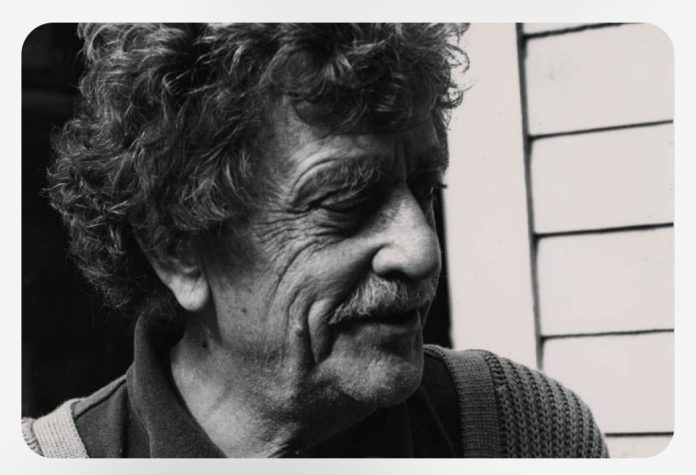The wonderful Kurt Vonnegut introduced
Kurt Vonnegut was an American author renowned for his distinctive voice, satirical wit, and profound insights into the human condition. Born on November 11, 1922, in Indianapolis, Indiana, Vonnegut grew up amidst the tumult of the Great Depression and World War II, experiences that deeply influenced his writing. His work often explored themes of war, technology, free will, and the absurdity of human existence.
Vonnegut’s early life was marked by tragedy. His mother committed suicide when he was just 21, a traumatic event that haunted him for the rest of his life. After studying chemistry at Cornell University, Vonnegut enlisted in the U.S. Army during World War II. He was captured by German forces during the Battle of the Bulge and imprisoned in a POW camp in Dresden. The firebombing of Dresden by Allied forces in February 1945 left a profound impact on Vonnegut, providing the basis for his most famous work, “Slaughterhouse-Five.”
After the war, Vonnegut worked as a journalist before turning to fiction full-time. His first novel, “Player Piano” (1952), depicted a dystopian future dominated by automation and class conflict. However, it was his fourth novel, “Cat’s Cradle” (1963), that brought him widespread acclaim. In “Cat’s Cradle,” Vonnegut satirised religion, science, and the arms race, introducing readers to his invented religion, Bokononism, and the concept of “ice-nine,” a substance with apocalyptic potential.
Vonnegut’s most famous work, “Slaughterhouse-Five” (1969), is a semi-autobiographical novel that blends elements of science fiction, satire, and anti-war sentiment. The novel follows the experiences of Billy Pilgrim, an optometrist who becomes “unstuck in time” and experiences various moments of his life, including his time as a POW in Dresden. “Slaughterhouse-Five” is celebrated for its anti-war message and its unconventional narrative structure, which reflects the disorientation and trauma of war.
Throughout his career, Vonnegut continued to publish novels, short stories, and essays that challenged conventional thinking and explored the absurdities of modern life. His works often featured recurring themes and characters, including the Tralfamadorians, a fictional alien race introduced in “Slaughterhouse-Five” who perceive time differently from humans.
In addition to his fiction, Vonnegut was known for his outspoken social commentary and his advocacy for humanism and pacifism. He was a vocal critic of war, environmental degradation, and the excesses of American capitalism. Vonnegut’s distinctive voice and dark humour earned him a dedicated following, and he remains one of the most beloved and influential American writers of the 20th century.
Kurt Vonnegut passed away on April 11, 2007, at the age of 84. Despite his death, his legacy continues to resonate with readers around the world, and his works remain as relevant and thought-provoking as ever. Through his writing, Vonnegut challenged readers to confront the absurdities of the human condition and to strive for a more compassionate and just world.
In 2006, a high school English teacher asked students to write to a famous author and ask for advice. Kurt Vonnegut was the only one to respond, and his response is magnificent:
“Dear Xavier High School, and Ms. Lockwood, and Messrs Perin, McFeely, Batten, Maurer and Congiusta:
I thank you for your friendly letters. You sure know how to cheer up a really old geezer (84) in his sunset years. I don’t make public appearances any more because I now resemble nothing so much as an iguana.
What I had to say to you, moreover, would not take long, to wit: Practice any art, music, singing, dancing, acting, drawing, painting, sculpting, poetry, fiction, essays, reportage, no matter how well or badly, not to get money and fame, but to experience becoming, to find out what’s inside you, to make your soul grow.
Seriously! I mean starting right now, do art and do it for the rest of your lives. Draw a funny or nice picture of Ms. Lockwood, and give it to her. Dance home after school, and sing in the shower and on and on. Make a face in your mashed potatoes. Pretend you’re Count Dracula.
Here’s an assignment for tonight, and I hope Ms. Lockwood will flunk you if you don’t do it: Write a six line poem, about anything, but rhymed. No fair tennis without a net. Make it as good as you possibly can. But don’t tell anybody what you’re doing. Don’t show it or recite it to anybody, not even your girlfriend or parents or whatever, or Ms. Lockwood. OK?
Tear it up into teeny-weeny pieces, and discard them into widely separated trash receptacals. You will find that you have already been gloriously rewarded for your poem. You have experienced becoming, learned a lot more about what’s inside you, and you have made your soul grow.
God bless you all!”
Kurt Vonnegut
Before you go, let Mark Kermode champion a “brilliant author.”.







